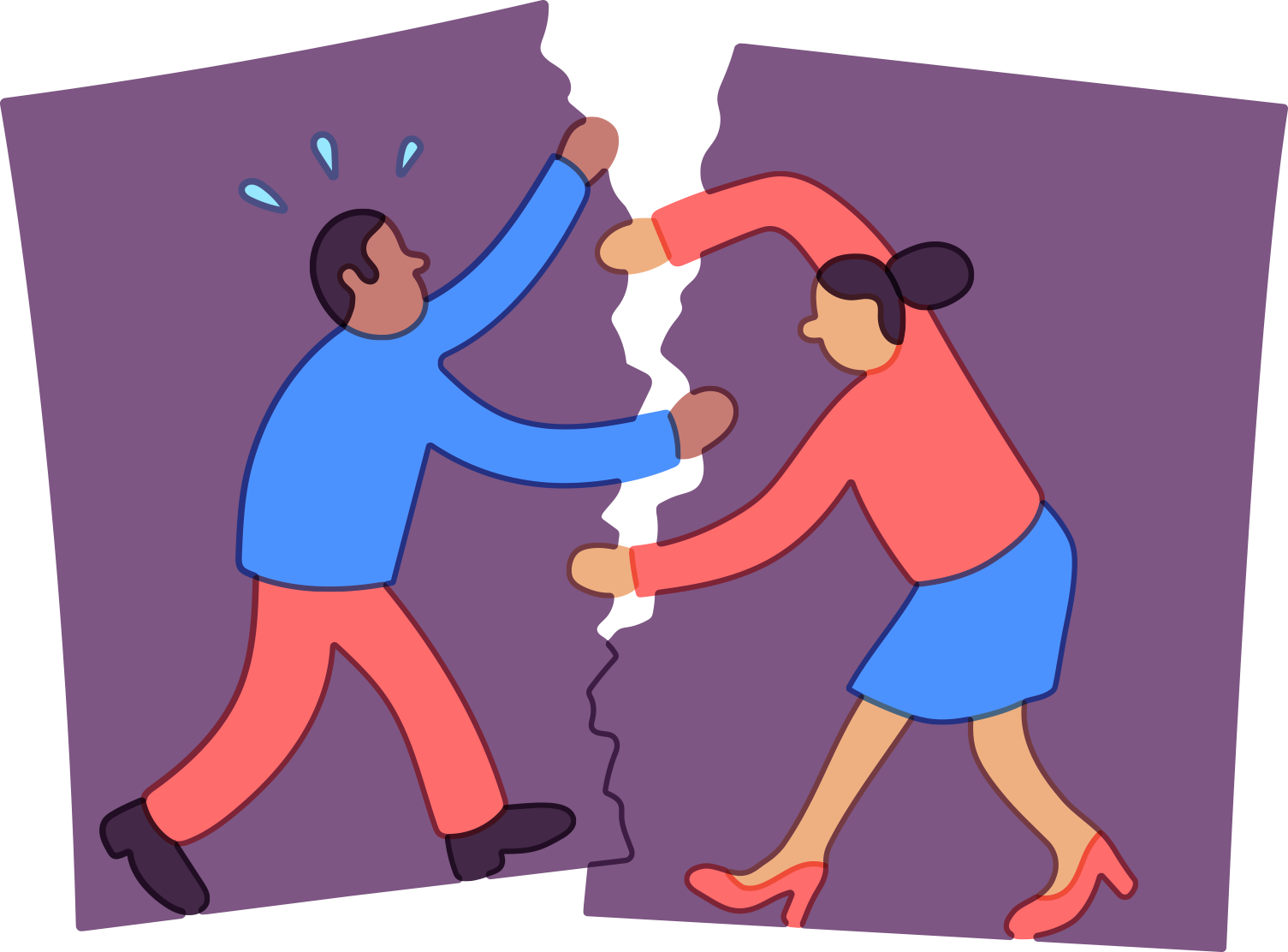Couples Counseling for America
Toward a More Perfect Union
By Peter Nelson
Illustrations by Tim Lahan

America is in need of marriage counseling.
Enter Bill Doherty '78 Ph.D. He's been a couples therapist for some 40 years — but over the past eight, he's taken on a new type of client.
"I was not involved in anything political until right after the 2016 presidential election," says Doherty. That's when two of his colleagues asked him to help get 10 Hillary Clinton voters and 10 Donald Trump voters together to try to talk with — and understand — one another. "The country was sort of in shock. I had a lot of experience — in the therapy world, but also in community engagement — and I knew a fair amount about facilitating groups. The idea was to see if they could get past the stereotypes of each other, and find some common ground."
Doherty's national organization, Braver Angels, grew out of that. The name evolved from "the better angels of our nature," a phrase in Abraham Lincoln's first presidential inaugural address.
"We are not enemies but friends. We must not be enemies. Though passion may have strained it must not break the bonds of our affection. The mystic chords of memory"¦ will yet swell the chorus of the Union, when again touched, as surely they will be, by the better angels of our nature." Â — 1st Inaugural Address, Abraham Lincoln
With alliances in all 50 states and 12,750 members nationwide, the programs differ somewhat from state to state, but the basic structure is always the same: two co-chairs — one Blue, one Red — together lead each state alliance.
Al Smith '65 (CLAS), the Red co-chair of the Connecticut Braver Angels Alliance, is a retired businessman who lives in Brookfield. He was a platoon leader in Vietnam, and has always considered himself a conservative. Smith says he started paying closer attention to politics after retiring from an outsourcing company. "About five years ago, I heard about Braver Angels and said that's what I believe in too. We have too much division, too much polarization, too much identity politics — and no civil discourse."
Chris Clouet is the Blue co-chair for Connecticut. He's a former school superintendent, former adjunct professor in UConn's Neag School of Education, current division chair of the Education Department at Mitchell College in New London, and a longtime liberal. In his superintendent role, he was seeing school board and PTA meetings getting out of hand. "There was just so much rancor and divisiveness, so much misinformation and disinformation," he says. "Before, people would say positive or negative things, but it was always personal, about their child, and that's fair. But what started to happen was that people would come in with prepared scripts about things like immigration, for example, and it started to become contentious. I wanted to join a group that could bridge the differences, to come together to listen to each other, without always winding up to get your next point in — while ignoring the person standing in front of you."
The ubiquitous and growing diviÂsiveness and rancor in America — people shouting and talking over each other — seems to have taken over not just political debates, but ordinary life. Family dinners, book clubs, poker groups, PTA meetings, coffee klatches, and community get-togethers are being torn apart. Braver Angels wants people to start understanding one another, to consider why someone might think differently. To that end, the group hosts debates, discussions, and workshops in places like schools and community clubs. Leaders and members alike stress that the idea is not to change minds, but to foster listening and understanding of differences.
Sounds like couples counseling.

Horror Movie Town Meetings
AKA "What I hear you saying is"¦"
Special projects coordinator Rick Porth and his colleagues at the Connecticut Conference of Municipalities in Hartford have taken a few Braver Angels sessions on civility and managing contentious public meetings. "Our members are mayors and first selectmen and town managers and so forth. They have to run a lot of public meetings, where sometimes there's some pretty contentious issues on the agenda," says Porth. There have always been such issues and disagreements, he says, but they've grown in recent years, "and a lot of the people I work for are eager to learn ways to try to manage this constructively."
The workshops, he says, have helped them stay focused on moving forward, "not litigating why we're where we are or pointing fingers or any of that kind of stuff. It's best to keep focus on the future — trying to figure out what you have in common, and how you can work together more constructively."
What marriage counseling magic makes these workshops work like that?
Longtime Greenwich resident Deirdre Kamlani got some insight when she wanted to set up some Braver Angels workshops for elected officials in her town, and steering committee member Gary Holland (see Holland's own story below, in the "Thanksgiving with Uncle Bob" section) suggested she take one first herself. Kamlani had spent 10 years in nonpartisan civic nonprofit work. She thought she had pretty good skills in terms of dealing with people of different political perspectives. She says she always practiced "engaging with respect, and really listening, and stating my point of view in a way where they would maybe understand it better. But when I went to the workshop, I learned that I could do things so much better. I'll give you one example. They had us pick the statement about policing that was the opposite of ours, and the first thing we had to do was restate that back to the person. The goal is to make sure that the person you're speaking with, who thinks very differently from you, feels heard by you and that you understand what their issues are. I did that restatement, and I thought it was pretty good. The moderator said to me, 'You know, you've actually kind of skipped ahead, and you've assumed some things about what the person was saying that they didn't actually say.' When I thought about it, he was 100% right. I assumed we had a common view on community safety, which might be a good assumption, but he said, 'Don't assume those things — just restate, as carefully as possible and as close to what that person said, back to them, so you're showing that you're really listening — and don't jump ahead and don't assume they were saying things they didn't.'
"I am definitely a better listener since then. I'm much more careful about making sure that I know what someone's really telling me."
One of many Braver Angels exercises devised by Doherty, whose UConn doctorate is in family studies, is The Fishbowl. A group is in the middle, chairs in a circle. A group with an opposing viewpoint arranges their chairs outside the circle. The people in the middle are asked, "Why are your side's values and policies positive and good for the country?" Then, "What are your reservations or concerns about your own side?" The people on the outside are just listening, trying to understand the people in the middle. And then they switch. Afterward everyone is asked what they learned about how people on the other side see themselves — and if they saw anything in common.
"These are principles out of couples therapy," says Doherty, "careful listening to try to understand the other person, as they see themselves. The willingness to admit that your side is not perfect. It does not have all the answers."

That Former Forever Friend
AKA "Help me understand."
Craig Diamond, who describes himself as having been a knee-jerk Democrat until a few years ago, got involved with Braver Angels after the events at the Capitol on Jan. 6, 2021. "My oldest friend Eric is a die-hard conservative Trump supporter. I've known him since kindergarten, around 50 years. We've stayed in touch, we see each other — I cherish his friendship, and he cherishes mine. But on Jan. 7, we were talking on the phone about what had happened. I was expecting him to say things like, 'I can't believe that happened. They stormed the Capitol, and that's terrible, and they are insurrectionists.' His reaction was not like that at all. His reaction was, it's not really that big a deal. It's not any different than the Black Lives Matter people, or the people rioting and breaking the law in Portland and other parts of the country. What's the difference?
"My jaw dropped, and I got angry. I started raising my voice, and I don't raise my voice to my friends. But I was starting to get really frustrated. I basically said, 'You know what? I gotta hang up because I'm overheated here. I can't.' He wanted to talk about how to process it and very calmly challenged me. I didn't want anything to do with it, because I just thought, 'My friend's gone off the deep end.' I hung up, but after about 15 minutes, I thought, 'Screw this. I'm not sacrificing this friendship over politics.'"
Diamond started a journey to understand conservatism. He changed his media diet. He worked with Braver Angels, which he says helped him stop his automatic us-and-them thinking. He and Eric are as close as ever for one reason, he says: "I started listening to him. That's how I resolved it."
It's all about leaving room for doubt, says therapist and Connecticut Braver Angels member June Malone of Trumbull. "I'll tell you what I think is the most dangerous thing, right now: certitude. People are certain that what they know, they know, and what they believe is right, and what they fear will actually happen. If you don't have room for doubt, you can't hear the other side." She throws out another tried-and-true therapy trick used by Braver Angels.
"I have found one of the most effective techniques, when I'm first meeting with a couple, is to have the wife take on the role of the husband and tell me why he is angry with her. Then the husband takes on the role of the wife and tells me why she is angry with him. Reverse roles, so that they see each other through each other's eyes. It works wonders to bring down the level of animosity so they can hear and understand each other better."
Tell your story, advises Clouet. "When you start talking about what brings you to your opinions," Clouet says, "what life events have helped mold your opinions, you start talking to someone else, and often you have things in common. Whether it's protecting a particular park, or something like that, in a community, suddenly you say, 'Oh, well — we both agree on that — what else do we agree on?"

We are deliberately not trying to change people's minds on the issues, or turn them into moderates. We're trying to change their minds about each other.
Thanksgiving with Uncle Bob
AKA "Tell me a story about..."
Gary Holland of Ridgefield, Connecticut, grew up in Houston, Texas, but ended up going to school at MIT in Boston. He still has a lot of relatives in Texas, Georgia, and Oklahoma. A couple of years ago the family was getting together in Oklahoma City for Thanksgiving.
"My father's family comes from Oklahoma," says Holland, "and I have an uncle there. I'll just call him Uncle Bob; he is a real irascible S.O.B. And he always took great delight in kind of picking on me, even from when I was a kid, because I was always a little out-of-the-box kid. He's extremely conservative. Since I moved up north and had the audacity to marry a nice Yankee girl from Connecticut, I'm the black sheep of the family. He took great joy in seeking me out and bending my ear about how horrible things were in the rest of the world because of all of the liberals, and it was always unpleasant for me.
"I knew this event was coming up, and I just happened to stumble across an announcement in the local newspaper about this Braver Angels workshop called Family and Politics about the skills to help you have a more pleasant gathering. I said, 'Why not?' I tuned in to the workshop and picked up a handful of good ideas. And then I went to the gathering, and I applied them, and for the first time in my life, I actually was able to have a real conversation with my Uncle Bob. It never really happened before. It was always kind of one-way, him beating up on me and criticizing my life and where I lived, and why aren't you back in Oklahoma or Texas? It was thoroughly pleasant for the first time."
What could possibly make such a big difference so quickly after so long?
"Very simple things," says Holland. "One of the simplest is the word 'Why.' So often when you're talking with somebody, and you have a disagreement with a position, or you're trying to understand them, you will say to them, 'Why do you think that?'
"One of the things I learned in the course was that the word 'Why' is, more often than not, interpreted judgmentally and antagonistically. The suggestion, in the workshop, is to use a different approach. Say, 'Well, I find it interesting, but I don't fully understand. Can you explain it to me?'
"Say it in the context of, 'Can you tell me a story? What was the road that led you to that conclusion? What informaÂtion? What experiences in your life "¦?' Because then, what you're doing is, you're asking the other person to share their story. Many times, one of the root causes of polarization is that people don't feel that they're heard anymore. Nobody listens to them. So they end up ranting and raving at each other, rather than taking the time to listen. Put the emphasis on understanding. Understanding is not agreement. It's just understanding. It's OK to have a different opinion, but the important thing is understanding the opposition. When you explore that, you then have the basis for communication, to try to find the common ground. I will tell you, it is very rare, if you orchestrate it correctly, that no matter how contentious, you can't find some common ground.
"If I could find some common ground with my Uncle Bob, trust me — you can find common ground with anybody."
Did they really understand one another better after this?
"Absolutely. Because for the first time, we actually talked about what it was that took me up north and why I stayed up there, which had nothing to do with politics. It had to do with people and environment. I said that the joy of spring in New England was by itself almost enough to keep me up north. And he found that amazing. That was an insight to him. Things that had nothing to do with politics, that would cause a person like myself to live in Yankee land."
OK. We may know what we shouldn't do and say to exacerbate issues, whether with our children and partners or our Uncle Bobs. But it's easier said than done, right? How do we respond in the moment — to a person who seems "other"?
"To the political scientists and social scientists who study polarization," Doherty says, "'othering' is the first thing they talk about. Others — people who differ from us politically or vote for different candidates — become strangers. 'Who in the world are these people? How could they possibly vote for or support that view?' That didn't used to exist between the parties. There were liberal Republicans and conservative Democrats. There was not the sense of, Who the hell are these people? We are deliberately not trying to change people's minds on the issues, or turn them into moderates. We're trying to change their minds about each other."
There's real danger in seeing the other side as monolithic or seeing individuals as one-dimensional.

It's the Guns/Babies/Immigrants
AKA "Never use words like 'never' and 'always'."
"When someone says, 'Those damn MAGA Republicans,' you're insinuating that all Republicans are MAGA when by whatever the definition is, maybe 30% of Republicans are MAGA, and then you're ticking off and excluding 70% who aren't," says Smith. "I'm a conservative, but two of the biggest issues that are liberal, or progressive, I totally agree with. I'm totally against what Republicans think on abortion and banning assault weapons. I carried an AR-15 in Vietnam. I don't think any citizen needs to have access to that weapon."
"I've shifted my language to talk about gun safety versus gun control," says Clouet. "Most gun enthusiasts agree that gun safety is important. Guns are serious business, and you have to be careful and thoughtful. I also support the traditionally conservative idea that government programs should be audited and reviewed, and when they become too bloated and ineffective, they should be either cut back or done away with. It's reasonable to have that expectation. We need to make sure our money's being spent wisely. I agree completely."
We contribute to polarization when we define people and political parties by their extremes, says Doherty. "The largest political party is not the Democrats or the Republicans," adds Smith. "It's Independents. About 41% of the people in this country don't define themselves as Republican or Democrat. Some lean red, some lean blue, but they want to look at it down the middle."
"I always say we're all neighbors first. We're all neighbors," says CT state Rep. Cristin McCarthy Vahey, who was invited to participate in a Braver Angels mediated conversation with then representative, now state senator Stephen Harding. "He's on the other side of the aisle, and we talked about that. There's a way to disagree without being disagreeable. And there's a way to debate issues without personally attacking one another, and having the ability to behave in a way that allows our brains to be fully unified, utilized, and not just in fight-or-flight mode. You can be very strongly on one side of the aisle, or on the issues, and not be difficult to talk to. I think that's the whole point of Braver Angels."
"It's a challenge," says Clouet, "to reach people who are very happy to be in their own bubble, in the echo chamber where everyone essentially agrees all the time, and you can just make fun of 'those people.' People of all different political ideologies do that."
When you're governing, you are representing all the people, says McCarthy Vahey. "There is no one human on the planet who I agree with 100% of the time. We're human, and what makes us human is we're unique individuals. We all have our own fingerprint. It's how we negotiate those differences with one another. Most of us who do this work, we have a passion for it. Sometimes that passion flutters into things that aren't as productive, but we're doing it because we care about these issues. And we don't always agree about how to do it.
"My hope is that the Braver Angels message, and engagement, continues to expand, because I think this year, again, we're going to be faced with a lot of polarizing conversations, well beyond legislators talking to each other. It's family members at dinner tables. It's neighbors down the street. If we want to maintain the fabric of our communities, and the relationships within our families, we are going to have to practice these same principles that Braver Angels is talking about."
The stakes are high. In a marriage, if counseling doesn't work, a divorce can be contentious or amicable. What would that look like for America?


Thank you for such a timely, thought-provoking piece. As a public school teacher, contentious conversations are more and more frequently showing up in my classroom, even at the elementary level. I had been heading into the presidential election this November with trepidation, knowing that things would get ugly. Nelson’s article gave me some great ideas on how to facilitate conversations among my students to help them (and me) to understand each other in a respectful way.
And let’s face it, it gave me good ideas to navigate family picnics with my own Uncle Bob, too.
Can we do a Braver Angels workshop on the UConn campus? I think there are several issues bubbling up from current events that are causing contentious conversations (or contentious silence). We can learn from the strategies described in this article.